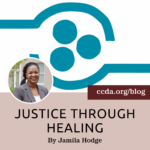A Message from President & CEO, Cecilia Williams
Last week, in my home city of Minneapolis (Minnesota), a jury found former Minneapolis police officer Derek Chauvin guilty on all three charges in the murder of George Floyd. It was an unprecedented moment, as for the first time in modern Minnesota history, a police officer was held legally accountable for the death of an unarmed BIPOC civilian.
And in that moment, there was a collective sigh.
Shortly after the verdict was rendered, Attorney General for the State of Minnesota and lead prosecutor Keith Ellison made a stark pronouncement. “I would not call today’s verdict justice,” he declared, “because justice implies true restoration. But it is accountability – which is the first step toward justice. Now, the cause of justice is in [our] hands.” Ellison’s declaration called into sharp reflection Tuesday’s poignant and visible nationwide demonstrations of celebration, vindication, victory – the overwhelming sense of moral rightness. His statement seemed to be reminding that while this was certainly a moment to exhale, it was a potent, single dose of relief.
When the brutality of how systems reliant upon racism operate is laid bare, there is an impulse to locate the totality of that violence in one person, rather than allow for an interrogation of the structure itself. When an unprecedented verdict such as that which was handed down last week in Minneapolis at last comes, there is an impulse to believe that the judicial system actually does work for everyone. And when the collective sigh is at once exhaled, it might somehow mistakenly signal a belief that the work is complete.
Yet, if we turn the page on this moment too quickly, we may miss what my prayer-warrior praying grandmother often called, “the good, old fashioned reckoning.” We may miss assessing a critical inventory of the interlocking systems that got us here in the first place. We may overlook the kind of social and spiritual fortitude and transformation that will be required to interrogate, indict and eradicate systemic and structural injustice, in policing and well beyond. And we may miss again the opportunity to listen deeply to those who have been most affected, not only by structural and communal inequity, but by centuries of racialized violence and trauma.
It is a moment of reckoning for the city and state that produced and nurtured me; a moment of reckoning for our nation and perhaps, for our world. It is certainly a moment of reckoning for the church.
Last week… there was a good result.
I engaged deeply a liturgy which gave me permission to release, at least temporarily, the pervasive anxiety and accumulated trauma of this past year. It invited me…
To Breathe.
To Exhale.
“If you feel relief, feel it. Don’t suppress the hope of the moment. Joy and sorrow can coexist.” @BlackLiturgies
Many, across the CCDA family join in the collective sigh of relief this historic moment has produced… we, who have long dreamed for and worked toward the kinds of persistent, durable investments in communities which ensure safety and wellbeing, and promote flourishing.
We simultaneously acknowledge that joy and sorrow do coexist. Shortly after Tuesday’s conviction, I attended a community memorial for 20-year-old Daunte Wright; as many had for 13-year-old Adam Toledo in Chicago just weeks before, and many will for 16-year-old Ma’Khia Bryant of Columbus in the days to come. Countless others will be memorialized following deadly encounters with law enforcement. This is the mournful reminder that the work is not finished.
The Chauvin verdict cannot end the pain of a grieving family. It cannot return victims of police violence to those who loved them. And it will not, in and of itself, transform the broken system which produced and protected Derek Chauvin for so many years. That work is ours.
The cause of justice is in our hands.




